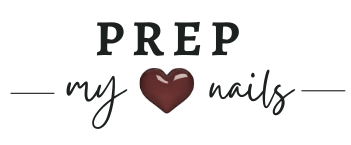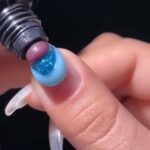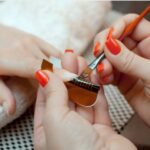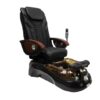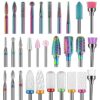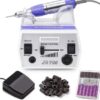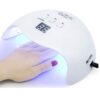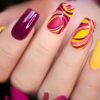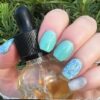Women’s lives are filled with current hues and maximum splendor thanks to acrylic nails, commonly known as artificial nails. Individuals may bring the colors, patterns, and motifs of their ideas and aspirations to life with this current nail art technique.
However, the procedure of creating this stunning nail art is not simple; that’s where the acrylic liquid plays a significant role.
Acrylic liquid, also called a monomer, is a necessary and active component of acrylic manicures. It is frequently blended with a polymer powder and aids in the long-term adhesion of the fake nails to your natural nails. It also gives your acrylic manicure a glossy and smooth finish, making it seem both attractive and elegant.
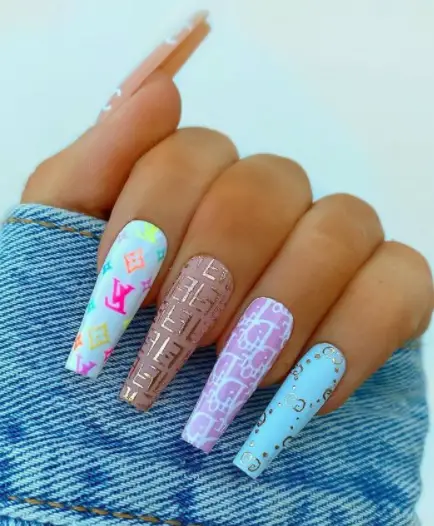
What Is an Acrylic Monomer?
Acrylic plastic is used to create artificial nail improvements. Acrylic is the general term for plastic manufactured from methacrylate, a chemical. Acrylic resins come in various forms, each based on a distinct type of methacrylate molecule, but their chemistry is the same. Acrylic is made by reacting a monomer liquid with a polymer powder to create molded nails. The liquid contains monomers (“mono” means “one”), which are small chemical units that react when combined with compounds in the powder. The monomers join together in a head-to-tail pattern to generate long fibers. Polymers are lengthy chains of monomers that join together (“poly” means “many”).
What Is Acrylic Liquid?
Acrylic liquid and acrylic monomer are the same things. It comprises acrylic monomers, which aid in bonding polymers in acrylic powders. It is, however, incredibly strong-smelling and, for that reason, you should not use it in a poorly ventilated room. The fumes may also irritate your eyes if you stick your head too near your nails. Ethyl methacrylate is the most common monomer utilized. Dimethacrylate or trimethacrylate are chemicals added to the acrylic formula to strengthen and quicken the bonding process. There are a variety of catalysts that can aid with this as well.
The Main Difference: Acrylic Liquid vs Monomer
Acrylic fingernails are made from a combination of powders and solutions. Polymer refers to the powder portion of the acrylic system, whereas monomer refers to the liquid component. The monomer present in the acrylic liquid is the source of the odor you typically sense in a traditional salon!
As a result, the acrylic liquid and monomer have no distinction. Non-yellowing acrylic liquid monomer provides superior adhesion. UV stabilizers are added to acrylic monomer liquid to ensure color clarity and prevent fading or dulling. When making acrylic nails, it can assure the best connection to the natural nail plate and an excellent sheen without a primer.
The monomer is just about as critical as the acrylic powder itself. As the acrylic cures, this vital liquid transforms the dust from the powder to the liquid and eventually to a solid.
The polymerization process, which involves joining individual molecules in acrylic powder, cannot occur without an acrylic monomer; therefore, you can understand why monomer fluid is so important to the entire acrylic process. Simply stated, if you don’t use any monomer liquid, the acrylic powder will remain an acrylic powder.
What Can You Use Instead Of Acrylic Monomer Liquid?
Unfortunately, there seem to be no perfect monomer liquid replacements in the market. The monomer was created exclusively for use on acrylic nails. Here are some monomer alternatives.
Resin Of Polyester
Polyester resin is chemically related to but not identical to epoxy resin, and most individuals do not have it on hand. Furthermore, the polyester resin may dry somewhat greenish, perhaps ruining your perfectly matching manicure color.
Alcohol Rubbing
In a pinch, rubbing alcohol MIGHT work, but the powder will not adhere, will be lumpy, the color will be wiped off, and the acrylic itself will be fragile. Using this procedure, you may anticipate your acrylic flake to fall off within a day.
Activator Powder For Dipping
Dip Powder Activator is an acrylic monomer, which means you may use it to make acrylic nails. The activator, however, is more expensive than the ordinary monomer liquid, plus it comes in a tiny bottle; thus, this procedure is unlikely to be feasible. You won’t be able to fit your acrylic brush into most activators since they come in a nail polish-shaped bottle.
Glue For Nails
Nail glue contains remarkably similar components to those found in the “base” fluid for dip nail powder systems. While it is far too thin and runny to function correctly, you can use it, and the acrylic powder should adhere if you have some on hand.
Conclusion
While there is no “perfect” substitute for acrylic monomer, we’ve found that nail glue or a dip powder system are the best options. When looking for an acrylic liquid, be sure it includes EMA (Ethyl Methacrylate) rather than MMA (Methyl Methacrylate) (Methyl Methacrylate). It is because MMA-containing formulations are poisonous and can harm your nails significantly. On the other hand, the EMA ones are entirely safe to use and non-toxic. They do, however, have a strong stink, so make sure all windows are open for appropriate ventilation. Also, choose alternatives that take more time to dry so you can correct any mistakes.
More On Acrylic Nails
- Fixed: I accidentally got my acrylic nails too long!
- Acrylic Nails Without A Drill – Why & How To?
- Beginner’s Guide To Acrylic Overlay On Natural Nails
- How long for Acrylic Nails to dry without UV light?
- Why Do Nails Grow Faster With Acrylic?
- 10 Tips For Getting Acrylic Nails For The First Time
- Acrylic Ballerina Nails Vs Coffin – Which Is Better?
- How To Get Rid Of Natural Nail Growth Under Acrylics?
- Nail Tips Vs. Acrylic – Which Is Better?
- How Long do your Nails have to be to get Acrylics?
- Can You Use Any Monomer With Your Acrylic Powder?
- How Long Does Acrylic Paint Last On Your Nails?
- Can You Mix Acrylic Powder With Gel?
- Can You Use and Mix Acrylic Paint With Nail Polish?
- Using clear nail polish to seal acrylic paint – Hot or Not?
- Are My Nails too Short for Acrylics? Overlay on Short Bitten Nails
- Does Acrylic Overlay Add Length to My Natural Nails?
